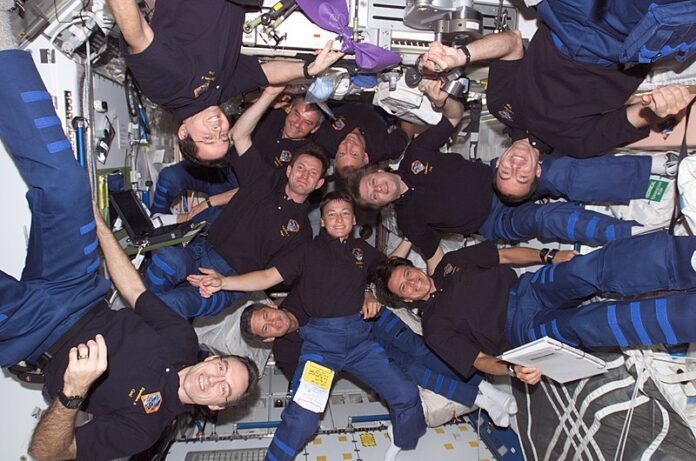Non-native English speakers face several barriers in conducting activities in سائنس. They are at disadvantages in reading papers in English, writing and proofreading manuscripts, and preparing and making oral presentations in conferences in English. With little support available at institutional and societal levels, non-native English speakers are left to overcome these disadvantages in building their careers in science. Given 95% of world population is non-native English speakers and general آبادی is the source of researchers, it is imperative to address the issues faced by them in conducting scientific activities because science can ill afford to miss contributions from such large untapped pool. Use of اے آئی پر مبنی tools could reduce language barriers for “Non-native English speakers” in science education and research by providing good quality translations and proofreading. سائنسی یورپی uses AI-based tool to provide translations of articles in over 80 languages. Translations may not be perfect but when read with original article in English, it makes comprehension and appreciation of the idea easy.
Science is perhaps most significant common “thread” that unifies human societies ridden with ideological and political fault lines. Our lives and physical systems are largely based on سائنس and technology. Its significance is beyond physical and biological dimensions. It is more than just a body of knowledge; science is a way of thinking. And we need a language to think, to access and to exchange ideas and information and to disseminate advancements in سائنس. That’s how سائنس progresses and takes humanity forward.
تاریخی وجوہات کی بناء پر انگریزی کا ظہور ہوا۔ انگریزی زبان بہت سے مختلف نسلی گروہوں کے لوگوں کے لیے اور بہت سے ممالک میں سائنس کی تعلیم اور تحقیق کا ذریعہ۔ انگریزی میں "سائنس میں لوگوں" اور "سائنسی طور پر ذہن رکھنے والے عام سامعین" دونوں کے لیے ایک بھرپور علم اور وسائل موجود ہیں۔ مجموعی طور پر، انگریزی نے لوگوں کو جوڑنے اور سائنس کو پھیلانے میں اچھی طرح سے کام کیا ہے۔
ایک چھوٹے سے شہر کے ایک غیر مقامی انگریزی بولنے والے کے طور پر، مجھے یاد ہے کہ میں نے اپنے کالج کے دنوں میں انگریزی زبان کی نصابی کتب اور سائنسی لٹریچر کو سمجھنے میں اضافی کوششیں کی تھیں۔ مجھے انگریزی میں آسانی پیدا کرنے میں یونیورسٹی کی تعلیم کے کئی سال لگے۔ لہذا، اپنے ذاتی تجربے کی بنیاد پر، میں نے ہمیشہ سوچا کہ سائنس میں غیر مقامی انگریزی بولنے والوں کو متعلقہ تحقیقی مقالوں کو سمجھنے اور تحریری مخطوطات اور زبانی پیشکشوں کے ذریعے مؤثر طریقے سے بات چیت کرنے کی صلاحیت کے لحاظ سے مقامی انگریزی بولنے والوں کے برابر آنے کے لیے اضافی کوشش کرنی چاہیے۔ سیمینار اور کانفرنسز. حال ہی میں شائع ہونے والا ایک سروے اس کی تائید کے لیے کافی ثبوت فراہم کرتا ہے۔
18 کو PLOS میں شائع ہونے والے ایک مطالعہ میںth July 2023, the authors surveyed 908 researchers in ماحولیاتی sciences to estimate and compare the amount of effort needed to conduct scientific activities in English between researchers from different countries and different linguistic and economic backgrounds. The result showed significant level of language barrier for non-native English speakers. The non-native English speakers need more time to read and write a paper. They require more efforts to proofread a manuscript. Their manuscripts are more likely to be rejected by the journals due to English writing. Further, they face major barriers in preparing and making oral presentations in seminars and conferences conducted in English. The study did not factor in mental stress, lost opportunities and cases of those who dropped out due to language barrier hence overall consequences on non-native English speakers are likely to be more severe than found by this study. In the absence of any institutional support, it is left on non-native English speakers to make extra efforts and investments to overcome the barriers and build careers in science. The study recommends provision of language-related support at institutional and societal levels to minimise the disadvantages for non-native English speakers. Given 95% of the world population is non-native English speakers and general population is the ultimate source of researcher, provision of support at institutional and societal levels is imperative. The society can ill afford to miss contributions in science from such a large untapped pool1.
مصنوعی ذہانت (AI) ایک سائنسی ترقی ہے جس میں بہت کم قیمت پر غیر مقامی انگریزی بولنے والوں کو درپیش کچھ اہم مسائل کو حل کرنے کی صلاحیت ہے۔ بہت سے AI ٹولز اب تجارتی طور پر دستیاب ہیں جو تقریباً تمام زبانوں میں اچھے معیار کے اعصابی ترجمہ فراہم کرتے ہیں۔ AI ٹولز کا استعمال کرتے ہوئے مخطوطات کو پروف ریڈ کرنا بھی ممکن ہے۔ یہ ترجمے اور پروف ریڈنگ میں محنت اور لاگت کو کم کر سکتے ہیں۔
غیر مقامی انگریزی بولنے والوں اور قارئین کی سہولت کے لیے، سائنسی یورپی تقریباً پوری بنی نوع انسان کو 80 سے زیادہ زبانوں میں مضامین کا اچھے معیار کا اعصابی ترجمہ فراہم کرنے کے لیے AI پر مبنی ٹول کا استعمال کرتا ہے۔ ترجمہ ہو سکتا ہے کامل نہ ہو لیکن جب انگریزی میں اصل مضمون کے ساتھ پڑھا جائے تو خیال کی سمجھ اور تعریف آسان ہو جاتی ہے۔ ایک سائنس میگزین کے طور پر، سائنٹفک یورپی سائنس اور ٹیکنالوجی میں ہونے والی اہم پیش رفت کو سائنسی ذہن رکھنے والے عام قارئین خصوصاً نوجوان ذہنوں تک پہنچانے کے لیے تیار ہے جن میں سے بہت سے مستقبل میں سائنس میں کیریئر کا انتخاب کریں گے۔
***
ماخذ:
- امانو ٹی، ET اللہ تعالی 2023. سائنس میں غیر مقامی انگریزی بولنے والے ہونے کے کئی گنا اخراجات۔ PLOS شائع شدہ: 18 جولائی 2023۔ DOI: https://doi.org/10.1371/journal.pbio.3002184
***






































